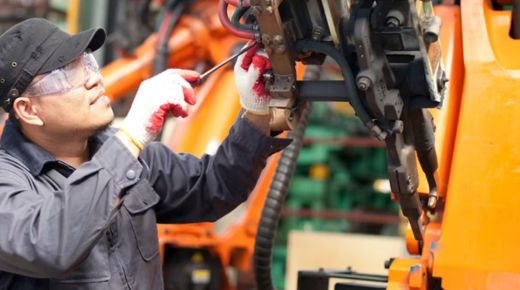7 Heavy Machine Maintenance Tips to Extend Longevity

Heavy machines are essential in construction, agriculture, and many industries. Proper maintenance is crucial to keep these machines running smoothly and to extend their life. Here are some simple tips to help you maintain heavy machines effectively.
1. Regular Inspection
The first step to keeping heavy machines in good shape is to inspect them regularly. Look for signs of wear and tear. Check the belts, hoses, and connections for any cracks or leaks. Make sure to examine the tires for proper inflation and tread depth. A quick visual inspection can catch problems early, preventing costly repairs down the road.
2. Keep it Clean
A clean machine is a happy machine. Dirt and debris can cause serious damage to moving parts. Make it a habit to wash your machines regularly. Pay special attention to areas where dirt can accumulate, like undercarriages and engine compartments.
Use a pressure washer to remove stubborn grime, but be careful not to use too much force on sensitive parts. Cleaning not only helps with performance but also makes it easier to spot potential issues.
3. Change the Oil
Oil is the lifeblood of any heavy machine. It lubricates moving parts, helps control temperature, and prevents wear. Check the oil level frequently and change it according to the manufacturer’s guidelines. Dirty oil can lead to engine problems, so don’t skip this step.
Additionally, consider using high-quality oil that meets the machine’s specifications. This small investment can lead to significant savings in repairs and downtime.
4. Check Fluid Levels
Just like oil, other fluids are vital for machine operation. Regularly check hydraulic fluid, coolant, and fuel levels. Low fluid levels can lead to overheating and decreased performance. Make it a point to top off these fluids regularly, and replace them when they become contaminated. Keeping the right levels will ensure that your machines work efficiently and last longer.
5. Rubber Stopper
Another simple but often overlooked maintenance tip is to check the rubber stopper. These small components play a big role in preventing leaks in hydraulic systems and other applications. Over time, rubber stoppers can wear out or become brittle.
Inspect them for cracks or deformities and replace them as needed. A simple replacement can save you from bigger hydraulic issues down the road.
6. Schedule Professional Servicing
While you can do a lot of maintenance on your own, professional servicing is essential. Schedule regular check-ups with a qualified technician. They have the tools and expertise to catch issues that you might miss.
A professional can also perform more complex tasks. Don’t wait until something breaks; proactive servicing is key to extending your machine’s life.
7. Timely Hydraulic Cylinder Repair
Hydraulic cylinders are critical components in many heavy machines. If you notice any leaking or reduced performance, it might be time for hydraulic cylinder repair. Don’t ignore these signs! A professional can fix seals, replace damaged parts, and ensure that your hydraulic system is working at its best. Regular maintenance of these cylinders can prevent major failures and costly repairs.
Conclusion
In conclusion, taking care of heavy machines is not just about fixing problems when they arise; it’s about preventing them in the first place. By following these tips—regular inspections, keeping machines clean, changing oil, checking fluid levels, scheduling professional servicing, and training operators—you can extend the life of your heavy machinery and save money in the long run.
